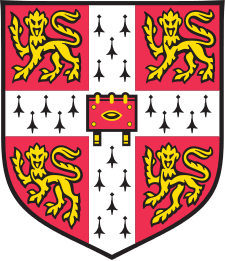Trinity Hall, Cambridge
| Colleges of the University of Cambridge | ||||||||||||
| Trinity Hall | ||||||||||||
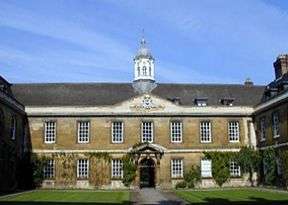 | ||||||||||||
|
| ||||||||||||
| Full name | College of Scholars of the Holy Trinity of Norwich | |||||||||||
| Founder | William Bateman, Bishop of Norwich | |||||||||||
| Named after | The Holy Trinity | |||||||||||
| Established | 1350 | |||||||||||
| Master | Revd Jeremy Morris | |||||||||||
| Undergraduates | 386[1] | |||||||||||
| Graduates | 209[1] | |||||||||||
| Sister colleges | All Souls College, Oxford; University College, Oxford | |||||||||||
| Location | Trinity Lane (map) | |||||||||||
 | ||||||||||||
| College website | ||||||||||||
| JCR website | ||||||||||||
| MCR website | ||||||||||||
| Boat Club website | ||||||||||||
Trinity Hall is a constituent college of the University of Cambridge, England. It is the fifth-oldest college of the university, having been founded in 1350 by William Bateman, Bishop of Norwich.
Historically, Trinity Hall was known for teaching Law; today, it teaches the sciences, arts and humanities. Notable alumni include theoretical physicists Stephen Hawking and Nobel Prize winner David Thouless, Australian Prime Minister Stanley Bruce, Canadian Governor General David Johnston, philosopher Marshall McLuhan, and Charles Howard, 1st Earl of Nottingham.
History
The devastation caused by the Black Death plague of the 1340s caused the loss of nearly half of the English population; Bishop Bateman himself lost nearly 700 of his parish priests, and so his decision to found a college was probably centred on a need to rebuild the priesthood. Thus in the foundation of 1350, Bateman stated that the college's aim was "the promotion of divine worship and of canon and civil science and direction of the commonwealth and especially of our church and diocese of Norwich." This led the college to be particularly strong in legal studies, a tradition that has continued over the centuries.[2]
At first all colleges in Cambridge were known as Halls or Houses (e.g., Pembroke College was called Pembroke Hall) and then later changed their names from Hall to College. However, when Henry VIII founded Trinity College, Cambridge next door, it became clear that Trinity Hall would continue being known as a Hall. This is also why it is incorrect to call it Trinity Hall College, although Trinity Hall college (lower case) is, strictly speaking, accurate. Interestingly a similar situation existed once before in the history of the University, when Henry VI founded King's College (in 1441) despite the existence of King's Hall (founded in 1317). King's Hall was later incorporated in the foundation of Trinity College in 1546.
Buildings


The college site on the River Cam was originally obtained from the purchase of a house from John de Crauden to house the monks during their study, and the main court was built in the college's first few decades.
The chapel was licensed in 1352 and built in 1366, in the year that Pope Urban V granted the Master and Fellows permission to celebrate Mass in the college. In 1729, Sir Nathaniel Lloyd redecorated the chapel in what, despite subsequent enlargements, remains an intimate style, forming the smallest of the University's chapels. The painting in the chapel is Maso da San Friano's Salutation or Visitation, depicting Mary's visit to Elizabeth, mother of John the Baptist.
Like the chapel, the Hall of the college was rebuilt by Sir Nathaniel Lloyd and enlarged in the 19th century. It also remains one of the smallest and most intimate halls in the University.
The college library was built in the late sixteenth century, probably during the mastership of Thomas Preston and is now principally used for the storage of manuscripts and rare books. The new Jerwood Library overlooking the river was opened by Lord Howe in 1999.
The college also owns properties in the centre of Cambridge, on Bateman Street and Thompson's Lane, and on its Wychfield Site next to Fitzwilliam College.
Gallery
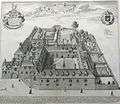 Trinity Hall in 1690
Trinity Hall in 1690 Trinity Hall's boathouse on the River Cam
Trinity Hall's boathouse on the River Cam Cambridge University, Trinity Hall
Cambridge University, Trinity Hall Cambridge University, Trinity Hall Master's Garden
Cambridge University, Trinity Hall Master's Garden Cambridge University, Trinity Hall Chapel
Cambridge University, Trinity Hall Chapel Cambridge University, Trinity Hall Library
Cambridge University, Trinity Hall Library Cambridge University, Trinity Hall Demolished
Cambridge University, Trinity Hall Demolished- The Elizabethan Library
 Interior wall showing Coat of Arms
Interior wall showing Coat of Arms View of the library
View of the library College cricket ground
College cricket ground Wychfield site
Wychfield site
People associated with Trinity Hall
Masters
The current Master is the Revd Jeremy Morris.[3] He took up the role on 1 October 2014 after Martin Daunton stepped down after ten years in post.[4]
Notable alumni
.png) Stanley Bruce, Prime Minister of Australia
Stanley Bruce, Prime Minister of Australia Hans Blix, Swedish Foreign Affairs Minister
Hans Blix, Swedish Foreign Affairs Minister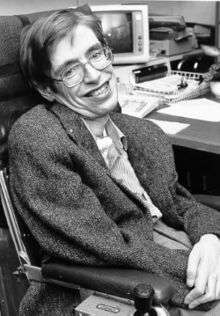 Stephen Hawking, theoretical physicist
Stephen Hawking, theoretical physicist.jpg) Geoffrey Howe, Conservative cabinet minister
Geoffrey Howe, Conservative cabinet minister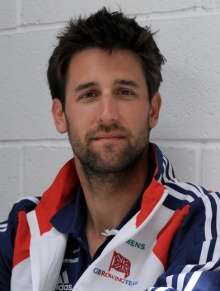 Tom James, British rower and Olympic Gold medallist
Tom James, British rower and Olympic Gold medallist.jpg)
_09.jpg) Andrew Marr, journalist and broadcaster
Andrew Marr, journalist and broadcaster Canadian philosopher Marshall McLuhan
Canadian philosopher Marshall McLuhan- Khawaja Nazimuddin, Prime Minister of Pakistan
%2C_by_Daniel_Mytens.jpg) The Earl of Nottingham, Elizabethan statesman
The Earl of Nottingham, Elizabethan statesman.jpg) J B Priestley, British novelist, playwright and broadcaster
J B Priestley, British novelist, playwright and broadcaster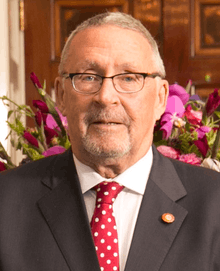
 Rachel Weisz, Oscar-winning actress
Rachel Weisz, Oscar-winning actress
- Zafar Ansari – Surrey and England cricketer
- Thomas Bilney – Protestant reformer and martyr
- Hans Blix – Former UN Chief Weapons Inspector
- Stanley Bruce – Prime Minister of Australia, 1923–29
- Richard Boyle – Rower. Bronze medal in 1908 Olympics
- Edward Carpenter – Socialist poet and homosexual activist
- John Cockett – Hockey player. Bronze medal in 1952 Olympics
- William Cooke – Hymn writer
- Archibald Craig – Fencer. Competed in the 1924 and 1948 Olympics
- Don Cupitt – Philosopher of Religion and scholar of Christian theology
- Sir Charles Dilke – Victorian politician
- Lawrence Doherty – Tennis player, Olympic gold medalist and Wimbledon Champion
- Reggie Doherty – Tennis player, Olympic gold medalist and Wimbledon Champion
- Lionel Elvin – educationist
- Ronald Firbank – novelist
- Billy Fiske – bobsleigh Olympian and first American fatality of WWII
- Norman Fowler – Politician
- Aubrey de Grey – Anti-ageing theorist
- Frances Harrison – journalist
- Stephen Hawking – Physicist
- Robert Herrick – poet
- Matthew Holness – Perrier Comedy Award-winning creator of Garth Marenghi
- Andy Hopper – Computer scientist
- Charles Howard, 1st Earl of Nottingham - admiral
- Geoffrey Howe – Former MP and Chancellor of the Exchequer
- Nicholas Hytner – Theatre and film director
- Magnus Linklater – Journalist
- Tom James – Rower, Olympic Gold medallist
- Greville Janner – Politician accused of child sexual abuse
- David Johnston – The Governor General of Canada
- Harold Kitching – Rower. Bronze medal in 1908 Olympics
- Donald Maclean – Soviet spy
- Andrew Marr – Political journalist and broadcaster
- Adam Mars-Jones – British novelist and critic
- Brett Mason - Australian Senator
- Alfred Maudslay – Archaeologist, explorer, and diplomat
- Alan Nunn May – Physicist and Soviet spy
- Reginald McKenna – Chancellor of the Exchequer during World War I
- Marshall McLuhan – Media theorist
- Sir John Meyrick – Rower. Silver medal in 1948 Olympics
- Peter Millett, Baron Millett – Law Lord
- John Monckton, 1st Viscount Galway – politician
- Khwaja Nazimuddin – Pakistan's second Prime Minister
- Donald Nicholls, Baron Nicholls of Birkenhead – Law Lord
- David Oliver - Geriatrician, President of the British Geriatrics Society
- Alan Pearsall – Naval Historian and curator at the National Maritime Museum
- Michael Peppiatt – Art historian
- Emma Pooley – Olympic silver medalist
- Alistair Potts – British World Champion coxswain
- J.B. Priestley – Writer
- William Barnard Rhodes-Moorhouse – First airman to be awarded the Victoria Cross
- Abigail Rokison – Shakespeare academic
- Alex Rushmer – Chef
- David Sheppard – Bishop and cricketer
- John Silkin – Former Government minister
- Samuel Silkin, Baron Silkin of Dulwich, of North Leigh in the County of Oxfordshire – former MP and Attorney-General
- William Smith – Hockey player. Gold medal in 1920 Olympics
- Tony Slattery – Perrier Comedy Award-winning comedian
- Douglas Stuart – Rower. Bronze medal in 1908 Olympics
- Leslie Stephen – Victorian writer and critic
- Sidney Earnest Swann – Rower, gold medalist in 1912 Olympics
- Sir Cyril Taylor - Businessman and social entrepreneur
- John Taylor – Hockey player. Bronze medal in 1952 Olympics
- John Thomas, Baron Thomas of Cwmgiedd - Lord Chief Justice of England and Wales
- David J. Thouless, theoretical physicist, Nobel Prize and Wolf Prize winner
- Nicholas Tomalin – Journalist and reporter
- Mark Tully – BBC radio broadcaster
- Edmund de Waal – Ceramic artist and author
- Terry Waite – Fellow Commoner of Trinity Hall
- Rachel Weisz – Academy Award-winning actress
- Sophie Winkleman – Actress
- John Wodehouse, 3rd Earl of Kimberley – Polo player, Olympics gold medalist
See also
References
- 1 2 "Student numbers" (PDF). University of Cambridge website. Archived from the original (PDF) on May 20, 2015. Retrieved 2009-10-11.
- ↑ "Trinity Hall -". cam.ac.uk.
- ↑ "Trinity Hall - Master". Trinity Hall Cambridge. Retrieved 18 April 2014.
- ↑ Martin Daunton
Bibliography
- The Hidden Hall: Portrait of a Cambridge College, Peter Pagnamenta, ISBN 1-903942-31-4
- Trinity Hall: The History of a Cambridge College, 1350-1975, Charles Crawley, ISBN 0-9505122-0-6
- Warren's Book (Ed. 1911 by A.W.W.Dale)
External links
| Wikimedia Commons has media related to Trinity Hall, Cambridge. |
Coordinates: 52°12′21″N 0°06′56″E / 52.2057°N 0.1155°E
